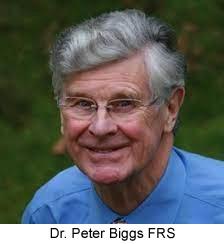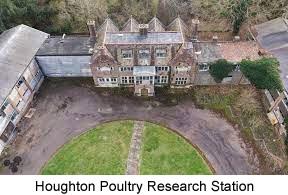 The American Association of Avian Pathologists (AAAP) has announced the passing of Dr. Peter M. Biggs on December 27th at the age of 95. Prior to his retirement, Dr. Biggs was the Director of the Houghton Poultry Research Station in the U.K. His career was devoted to research on avian tumors. His pivotal contribution was to differentiate between lymphoid leucosis, a retroviral condition and Marek’s disease caused by a herpesvirus. Dr. Biggs named this condition in recognition of Professor Josef Marek who described the clinical presentation and the gross and histological neural lesions in 1907.
The American Association of Avian Pathologists (AAAP) has announced the passing of Dr. Peter M. Biggs on December 27th at the age of 95. Prior to his retirement, Dr. Biggs was the Director of the Houghton Poultry Research Station in the U.K. His career was devoted to research on avian tumors. His pivotal contribution was to differentiate between lymphoid leucosis, a retroviral condition and Marek’s disease caused by a herpesvirus. Dr. Biggs named this condition in recognition of Professor Josef Marek who described the clinical presentation and the gross and histological neural lesions in 1907.
Dr. Biggs was evacuated to the U.S. during World War II and attended high school in Cambridge MA. On his return to England Dr. Biggs joined the Royal Air Force in the autumn of 1944 and was detached to Queen’s University, Belfast under a university short course program similar to our OTC programs. He holds the distinction of flying solo in a De Havilland Tiger Moth biplane trainer in only five hours compared to a normal ten hours. Eschewing aviation on demobilization and following a keen interest in zoology he entered the Royal Veterinary College in London graduating in 1952. He undertook doctoral research in avian virology at the Veterinary School of the University of Bristol. In 1955 he completed his doctoral degree and was appointed a Lecturer (Assistant Professor) in veterinary clinical pathology moving to the Houghton Poultry Research Station in 1959 to study avian leucosis.
Dr. Biggs was a frequent visitor to the United States and developed collaborative projects with colleagues Drs. Ben Burmeister and Graham Purchase at the USDA-ARS Avian Disease and Oncology Laboratory in East Lansing, MI. He was responsible for the first Marek’s vaccine.
 He undertook projects in oncology in cooperation with Duke University, the National Cancer Institute and Cornell University. He was appointed director of the Houghton Poultry Research Station and the Institute for Animal Health in 1973 and served in that position for 12 years. He retired in 1987 but maintained an interest in the British Veterinary Association. Other contributions to the poultry industry included establishing the World Veterinary Pathology Association and the Founder Editor of Avian Pathology.
He undertook projects in oncology in cooperation with Duke University, the National Cancer Institute and Cornell University. He was appointed director of the Houghton Poultry Research Station and the Institute for Animal Health in 1973 and served in that position for 12 years. He retired in 1987 but maintained an interest in the British Veterinary Association. Other contributions to the poultry industry included establishing the World Veterinary Pathology Association and the Founder Editor of Avian Pathology.
Among many honors, Dr. Biggs was selected as a Fellow of the Royal Society in 1976, the ultimate U.K award in science and was a Founding Fellow and Council Member of the Academy of Medical Sciences established in 1998. He served on many U.K. government committees including control of biological weapons and scientific aspects of international security.